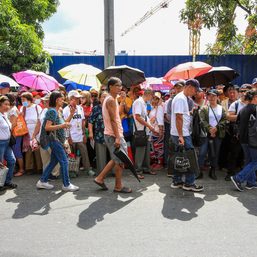SUMMARY
This is AI generated summarization, which may have errors. For context, always refer to the full article.

Claim: President Ferdinand Marcos Jr. declared war on China during his speech commemorating the 82nd anniversary of Araw ng Kagitingan (Day of Valor) on April 9.
Rating: FALSE
Why we fact-checked this: The YouTube video bearing the claim was uploaded on April 10 and gained 71,652 views, 2, 200 likes, and 851 comments as of writing.
The video’s title reads: “Nilusob na China sa Manila! PBBM nagdeklara na! Gyera na! Malaking gulo to! Damay lahat dito Chinese.”
(China is attacked in Manila! PBBM has made a declaration! It’s war! This is a big conflict! All Chinese will be affected.)

The facts: The footage used in the misleading video was from the President’s Day of Valor speech on April 9 at the Mount Samat National Shrine in Pilar, Bataan. Contrary to the claim, Marcos did not declare war on China, but urged Filipinos not to yield to those who present “clear and present threats to our sovereign rights” and to draw inspiration from the patriotism of Filipino World War II heroes. (FAST FACTS: Araw ng Kagitingan)
“Ang mga ito ay hindi katanggap-tanggap. Hindi makatuwiran o makatarungan, lalo na sa panahong ito ng payapang pakikipag-ugnayan ng mga bansa. Nawa’y magsilbing inspirasyon ang mga kaganapan noong 1942 at ang tagumpay natin noong 1945 sa ating lahat,” Marcos said.
(These are not acceptable, reasonable, or just, especially at this time of peaceful cooperation among nations. May the events of 1942 and our victory in 1945 serve as inspiration for all of us.)
“Tulad ng pinamalas ng ating mga dakilang ninuno, hindi tayo dapat magpasupil at magpaapi, lalo na sa loob ng ating sariling bakuran. Nawa’y mapagkunan natin ito ng pang-ibayong kamalayan, tapang, at lakas ng loob,” he added.
(As our great ancestors have demonstrated, we should not be subjugated or oppressed, especially within our own territory. May we draw from this a deeper sense of awareness, courage, and resilience.)
Nowhere in the transcript of the speech was a declaration of war mentioned, nor was the speech directly addressed to China, contrary to what the video suggests.
ALSO ON RAPPLER
- Why DOJ pushes case vs ex-employers of abused domestic helper Elvie Vergara
- Francisco Motors wants to give free jeepneys. Slow LTFRB permits stand in the way.
- Political prisoners wait an average of 4 years in jail while on trial
Japanese envoy: The video also claimed that Japan’s Ambassador to the Philippines Endo Kazuya, who attended the commemoration, dared China to try invading the Philippines and see for itself how fierce Japan can be.
This is contrary to what the envoy said. In his speech, he said, “We, the Japanese people, are determined to never allow the devastation of war to be repeated ever again for the sake of present and future generations,” a reference to the Japanese occupation of the Philippines from 1942 to 1945. No line from his speech provoked China to invade the Philippines.
China’s assertive actions: The video was posted amid rising tensions between the Philippines and China in the West Philippine Sea, which Beijing claims as part of its territory in defiance of a historic 2016 ruling dismissing its expansive maritime claims. ([EXPLAINER] South China Sea: Why are China and Philippines tensions heating up?)
Tensions in the South China Se were a key issue in the first trilateral summit between the US, Japan, and the Philippines on April 11. Marcos, US President Joe Biden, and Japanese Prime Minister Fumio Kishida met at the White House to discuss peace and stability of the Indo-Pacific region, including ensuring freedom of navigation in the South China Sea, and economic collaboration among the three nations.
During the summit, Biden reaffirmed the US commitment to protecting the Philippines against any armed aggression in the West Philippine Sea. This move is perceived as a cautionary message to China and a reassurance to allies concerned about Chinese actions in the region. – Brian Jay B. Baybayan/Rappler.com
Brian Jay Baybayan is a campus journalist from the Mindanao State University-General Santos City. Editor-in-chief of The Papyrus, he is also an Aries Rufo Journalism fellow of Rappler for 2023-2024.
Keep us aware of suspicious Facebook pages, groups, accounts, websites, articles, or photos in your network by contacting us at factcheck@rappler.com. You may also report dubious claims to the #FactsFirstPH tipline by messaging Rappler on Facebook or Newsbreak via Twitter direct message. You may also report through our Viber fact check chatbot. Let us battle disinformation one Fact Check at a time.
Add a comment
How does this make you feel?





![[In This Economy] Marcos’ POGO ban is popular, but will it work?](https://www.rappler.com/tachyon/2024/07/thought-leaders-marcos-pogo-ban.jpg?resize=257%2C257&crop=255px%2C0px%2C720px%2C720px)
![[Rappler Investigates] POGOs no-go as Typhoon Carina exits](https://www.rappler.com/tachyon/2024/07/newsletter-graphics-carina-pogo.jpg?resize=257%2C257&crop=424px%2C0px%2C1080px%2C1080px)











There are no comments yet. Add your comment to start the conversation.